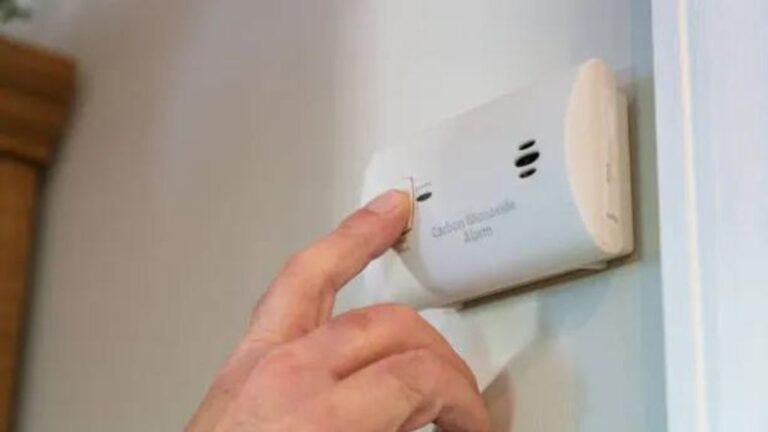Carbon monoxide (CO) detectors are essential devices that help safeguard your home and loved ones from the dangers of carbon monoxide poisoning. This silent, odorless gas can be deadly, and having a detector in your home is one of the most important safety measures you can take. But what does it mean when your carbon monoxide detector starts beeping? Understanding the reasons behind these beeps can help you respond appropriately and ensure the safety of everyone in your household.
Table of Contents
1. Low Battery Alert
One of the most common reasons your carbon monoxide detector might be beeping is due to a low battery. Similar to smoke detectors, CO detectors require batteries to operate. When the batteries are running low, the detector emits a series of short, consistent beeps to alert you that it’s time to replace them. Typically, this will be a single beep or chirp every 30 to 60 seconds.
What to Do:
- Replace the batteries immediately.
- If the detector is hardwired, check if the backup battery needs replacing.
Preventative Tip: Regularly check your detector’s batteries and replace them at least once a year, or as recommended by the manufacturer.
2. End-of-Life Warning
Carbon monoxide detectors don’t last forever. Over time, the sensors inside the detector that identify the presence of CO gas degrade, which diminishes their effectiveness. Most CO detectors have a lifespan of 5 to 7 years. When your detector is nearing the end of its operational life, it will alert you with a series of beeps, often more rapid and continuous than a low battery warning.
What to Do:
- Check the manufacturer’s instructions to determine the lifespan of your detector.
- If your detector is near or past its expiration date, replace it with a new one.
Preventative Tip: Mark the installation date on the detector or keep a note of when you installed it so you know when it’s time to replace it.
3. Carbon Monoxide Detection
If your carbon monoxide detector is emitting a loud, continuous series of beeps, it may have detected dangerous levels of carbon monoxide in your home. This is the most critical alarm your detector can produce, and it should never be ignored.
What to Do:
- Immediately evacuate everyone from the building.
- Call emergency services or the fire department from outside your home.
- Do not re-enter the building until it has been inspected and declared safe by a professional.
Preventative Tip: Ensure your home has proper ventilation and that fuel-burning appliances are regularly inspected and maintained by qualified professionals.
4. Malfunctioning Detector
Sometimes, your carbon monoxide detector might beep due to a malfunction. This can occur if the detector has been damaged or if there is an issue with the internal circuitry. In such cases, the beeping might not follow the typical patterns of battery warnings or end-of-life alerts.
What to Do:
- Check the user manual for troubleshooting steps.
- If resetting the detector doesn’t stop the beeping, replace the unit.
Preventative Tip: Keep your detector clean and free from dust and debris, and test it regularly to ensure it’s functioning properly.
5. Interference or Electrical Issues
External factors such as power surges, interference from other electronic devices, or even dust and dirt inside the detector can cause it to beep unexpectedly. While this is less common, it’s still a possibility to consider if you’ve ruled out other causes.
What to Do:
- Try resetting the detector according to the manufacturer’s instructions.
- Ensure the detector is placed away from other electronic devices that could cause interference.
Preventative Tip: Regularly clean your detector and keep it in an area free from potential sources of interference.
FAQs
1. How often should I test my carbon monoxide detector?
- It’s recommended to test your carbon monoxide detector at least once a month to ensure it’s functioning correctly.
2. Can a carbon monoxide detector beep if there is no CO present?
- Yes, a carbon monoxide detector can beep due to low batteries, end-of-life warnings, malfunctions, or other issues unrelated to the presence of carbon monoxide.
3. How can I tell the difference between a low battery beep and a CO alarm?
- A low battery beep is usually a single chirp every 30 to 60 seconds, while a CO alarm is a continuous series of loud beeps.
4. What should I do if my carbon monoxide detector keeps beeping after changing the batteries?
- If the beeping continues after changing the batteries, the detector might be malfunctioning or nearing the end of its life. Consider replacing the unit.
5. Where should I place my carbon monoxide detectors in my home?
- Place carbon monoxide detectors on every level of your home, especially near sleeping areas. Avoid placing them near fuel-burning appliances to prevent false alarms.
6. Can I silence a carbon monoxide detector that’s beeping?
- While you can temporarily silence some detectors, it’s crucial to address the underlying issue, whether it’s a low battery, malfunction, or actual carbon monoxide detection.
Conclusion
A beeping carbon monoxide detector is a serious alert that requires your immediate attention. Whether it’s a low battery, an end-of-life warning, or a detection of CO gas, understanding the cause and taking prompt action can protect you and your loved ones from potential harm. Always ensure your detectors are in good working order, and don’t hesitate to replace them when necessary. Your safety depends on it.

